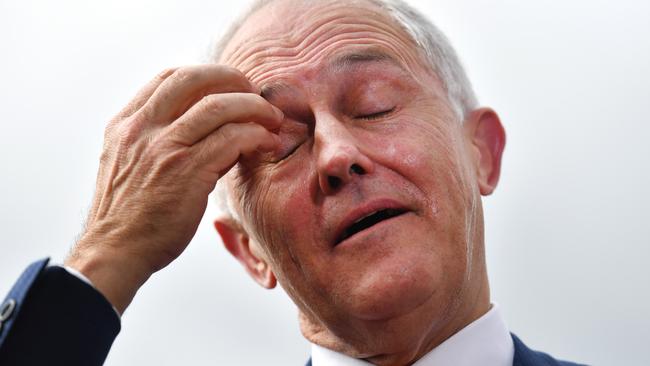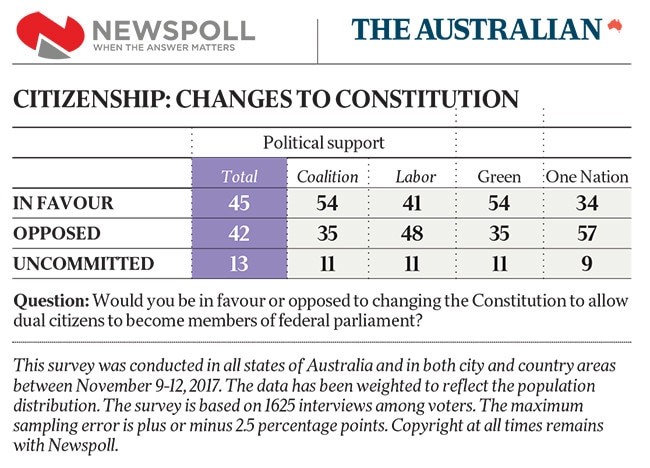Citizenship showdown nears for Turnbull
Malcolm Turnbull is heading for a political showdown on citizenship that threatens to eclipse his agenda.

Malcolm Turnbull is heading for a political showdown on citizenship that threatens to eclipse his agenda in the final weeks of federal parliament this year, amid a widening storm over the right of up to 10 federal MPs to hold office.
The Prime Minister agreed to Bill Shorten’s demand for a December 1 deadline for all MPs to prove their citizenship, bringing forward a clash in parliament that could turn into a war of attrition.
As voters slash Mr Turnbull’s lead over Mr Shorten as preferred prime minister in the latest Newspoll, the government is fighting a December 16 by-election in the key seat of Bennelong to save Liberal MP John Alexander and keep its majority in parliament.
The government will be vulnerable for the fortnight when parliament resumes on November 27, lacking not only Mr Alexander but also former deputy prime minister Barnaby Joyce, given concerns it could take several days for him to return to parliament if he wins the December 2 by-election in the seat of New England.
With parliament in chaos over the citizenship fiasco — which yesterday saw Tasmanian crossbench senator Jacqui Lambie announce she could resign as early as today if she is confirmed as a British dual citizen — a special Newspoll conducted exclusively for The Australian shows more voters favour changing the constitutional ban on dual citizenship than keeping the existing rules.

The findings suggest a bipartisan agreement to amend the Constitution at a referendum could secure a majority, given 45 per cent of voters support change while 42 per cent are against.
But Australians are split along party lines, with 54 per cent of Coalition voters and 54 per cent of Greens voters in favour of allowing dual citizens to sit in federal parliament while 57 per cent of One Nation voters oppose the change. Labor voters are split on the idea of amending the Constitution with 48 per cent against and 41 per cent in favour.
Buoyed by the Newspoll result, Mr Shorten accused Mr Turnbull of trying to drag out the deadline for citizenship disclosures in a way that would have forced a recall of parliament at a cost of $1 million a day.
“Labor has nothing to hide. We will put forward our information. We have done our homework. We have got our legal advice and we think there should be one rule for all,” Mr Shorten told Labor senators.
“I do not doubt the extent of the loss of faith of the Australian people in the government, and through the government’s ineptitude, in the parliament.”
The government is confident of securing the numbers on the floor of the House of Representatives to refer Labor MPs to the High Court to decide on their citizenship if Mr Shorten refuses to support the referral.
Greens leader Richard Di Natale said the party would vote for the referral of MPs from other parties with doubts over their status.
At least 10 MPs are being targeted in the growing stoush, including Labor MPs Justine Keay, Madeleine King, Susan Lamb and Josh Wilson, all exposed because of their British heritage.
Labor insisted all four had taken reasonable steps to renounce any foreign citizenship, producing legal advice from Melbourne barrister Peter Hanks QC arguing that an MP did not have to wait for formal registration of their renunciation by a foreign government to be in the clear.
Mr Hanks cited a key passage in the recent High Court ruling on Resources Minister Matt Canavan, which said the question was whether the MP had “taken all steps that are reasonably required by the foreign law to renounce his or her foreign citizenship” rather than whether the foreign power had concluded all the steps on its side of the process.
The government has advice from former solicitor-general David Bennett QC that says MPs could be disqualified if the British government did not register their renunciation before the close of nominations.
Mr Bennett, who represented Senator Canavan in the High Court, said this meant Ms Keay, Ms Lamb and Nick Xenophon Team MP Rebekha Sharkie were disqualified but he added that “this view cannot be expressed with absolute certainty” because the court might retreat from the strict view handed down last month.
As well as the four Labor MPs and Ms Sharkie, the government is exposed to a Labor threat to “go nuclear” with challenges to five Liberal MPs: Julia Banks, Nola Marino, Alex Hawke, Tony Pasin and Ann Sudmalis, all of whom have been the subject of media reports but no legal decisions over their status.
Acting Prime Minister Julie Bishop acknowledged the government was dealing with “uncertain times” as a result of the citizenship woes, while Finance Minister Mathias Cormann conceded the “messiness” had cost the Coalition support.
Mr Turnbull’s supporters insisted yesterday he could hold on to the leadership despite the dire polling results.
Opening a chance for Mr Turnbull to promote aspiring ministers, Victorian Liberal senator Scott Ryan resigned as special minister of state yesterday to take up the position of president of the Senate.


